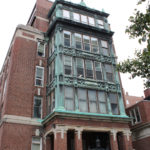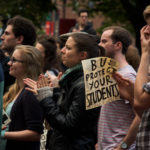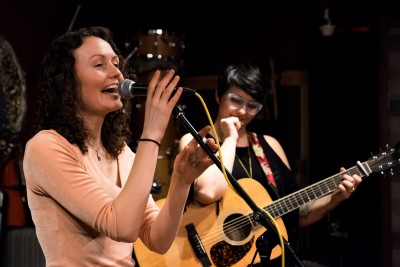
Hailey Magee, a 22-year-old rising singer-songwriter, is a fighter. Her passion for sharing stories through her music has always driven her to take chances and put herself out there, but she recently realized there was an obstacle in her path.
Though the Boston music scene is a unique place to explore the musical world, it has become blatantly obvious to Magee that it isn’t as diverse as it should be, especially when it comes to female representation.
Despite the enormous amount of talent in many female musicians, men usually dominate shows in Boston. In 2015, less than 20 percent of all Cambridge music performers were women, Magee said.
“Women are tokenized,” she said. “It’s because there are so much fewer of us that folks think about us as women first and musicians second. They respond to us as women, so they hit on us and they touch us.”
Though disrespect usually comes in subtler forms, Magee refuses to let it slide.
She organized the Emerging Boston Area Singer-Songwriters’ “The Power of Disbelief,” a concert held Friday designed to shed light on the issue of gender representation. EBASS is “a community of over 500 singer-songwriters that bridges the gap between emerging and established artists in Boston by offering opportunities to connect, promote, and perform,” according to its website. Magee founded EBASS in 2014.
Friday was EBASS’s first concert directed at the issue of female inequality in the music scene, and its primary mission was to give aspiring musicians a place to grow and perform.
Reaching the room’s full capacity, more than 90 concertgoers squeezed into Lilypad, a cozy performance venue in Cambridge.
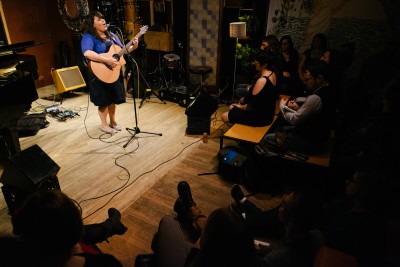
Two Boston-based singer-songwriters, Mary Henriquez and Heather Woods, also performed, stunning the audience with a full spectrum of emotion from heart-wrenching stories of the past to calls for strong female empowerment.
The concert solidified that Magee is not alone in her stand for better representation of female musicians. Henriquez said in an interview that after she released a six-song EP last year, it took six months for someone to book her show since she was “consistently ignored by bookers.”
“In the music business, you often experience a lot of reduction and coldness and sometimes there’s a real lack of humanity, which is very upsetting because music is all about learning to have empathy and learning to love and process your feelings,” Henriquez said. “It’s sad to think that within that field, there can be so much coldness.”
Although she admits it can be discouraging, Henriquez said she is ultimately excited about how the Boston music scene will evolve.
At the concert, Magee showed audience members an open letter to all the bookers in the Boston area, thanking them for their hard work and encouraging them to ensure they would feature a balanced group of performers in their shows. She asked everyone to sign the letter to show support for the cause, and by the end of the night, she’d accumulated more than 80 signatures.
EBASS members are also thinking of making April a “Musician Wellness” month to continue to create an emphasis on the importance of the movement.
“I want to build momentum,” Magee said. “We don’t want it to end in that room.”
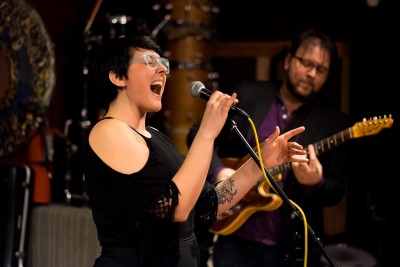
The reaction to the music and the message of the concert implies that it won’t. By partnering with other groups to produce similar shows, Magee is hopeful that they will just gain energy. Mass NOW and Queer Women in Music, two organizations that promote justice for anyone who identifies as a woman, have supported the cause alongside EBASS and showed up at the concert to provide more information about their own missions and ways to get involved.
Their messages are beginning to resonate. After Magee had explained that she wanted to back out of a show where she was the only female performer, the booker responded on a fully apologetic and sincere note. They’re now working together to build a show that is completely gender equal. Once the issue is brought to the attention of Boston bookers, Magee said she believes they’ll be just as receptive.
“They care about what their community members think about their shows,” she said.
The movement isn’t only about reaching out to bookers, but also to people in the community who may not be aware of the misrepresentation in the music world. Many don’t actually realize how unbalanced it can be, Magee said, but EBASS is ready to change that.
“I think I’ve learned that as a white man, it’s always easy for me to fit in and so I always have to be patient and try to understand the story and what it’s like to be a woman or identify as a woman,” said Eric Connelly, 28, an attendee from Cambridge and a consultant at Workbar. “It’s being patient and open to seeing things differently than I thought before and also being curious and being ready to change my perspective.”



